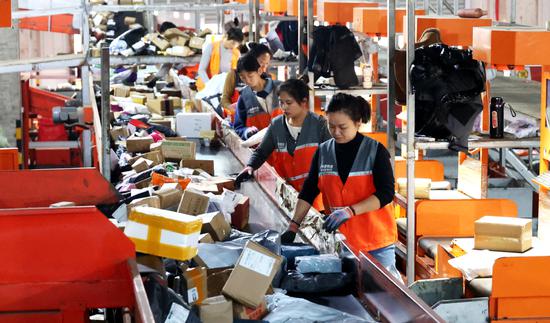Tech products, AI services drive Singles Day sales

Workers sort express delivery packages at a courier logistics company in Lianyungang, Jiangsu province, on Monday. (GENG YUHE/FOR CHINA DAILY)
Chinese consumers have shown vibrant purchasing power for premium intelligent electronic devices and home appliances featuring innovative technologies during this year's Singles Day shopping carnival, which experts said played a vital role in promoting the recovery of consumption and shoring up the economy.
They added that as China's biggest online shopping event, the Double Eleven promotional gala, which began in mid-October and reached a crescendo on Monday, has witnessed the accelerated application of artificial intelligence technology in the retail industry to improve merchants' operational efficiency, provide shoppers with personalized recommendations and bolster sales.
Major e-commerce platforms initiated the campaign 10 days earlier this year than previously, and adopted a more pragmatic and simpler approach with direct price reductions becoming a preferred strategy, as Chinese consumers have become more rational about potential purchases, said market observers.
Data from Tmall, Alibaba's business-to-customer platform, showed that 139 household appliance brands saw their sales surpass 100 million yuan ($13.9 million) between 8 pm on Oct 21 and midnight on Monday, fueled by the country's consumer goods trade-in program and massive shopping subsidies from governments and retailers.
The turnover of 34 consumer electronics brands, including Huawei, Xiaomi, Oppo and Apple, surpassed 100 million yuan during the period, while high-end smartphones saw robust growth, with sales of domestically manufactured Android phones priced above 4,000 yuan rising 57 percent year-on-year, Tmall said.
According to JD, another major e-commerce player, nearly 3,000 home appliance brands doubled their transaction volume over the weekslong shopping festival, with sales of mini LED televisions and robotic vacuum cleaners surging more than twelvefold year-on-year.
The transaction volume of gaming laptops increased 120 percent year-on-year, and AI smartphones and 4K projectors experienced 100 percent growth in turnover via JD's online marketplaces. Sales of AI learning devices and 3D printers skyrocketed more than tenfold from a year earlier.
Consumption has become the main driving force boosting China's economic growth, and the Singles Day shopping extravaganza is pivotal to further stimulating people's purchasing appetites and unleashing new consumption potential, said Wang Yun, a researcher at the Chinese Academy of Macroeconomic Research.
Wang said that more stimulus policies are needed to stabilize and expand employment, improve household incomes, cultivate new consumption growth points by leveraging digital technologies and boost people's ability and willingness to spend.
Online retailers have attached greater importance to improving user experience and seeking high-quality and long-term growth this year, given that Chinese shoppers are more prudent and careful in reviewing their needs, said Yu Jian, managing director and vice-executive president of CTR Media Convergence Institute.
"A series of pro-consumption policies, such as the consumer goods trade-in program, are crucial for revving up the sales of electronic devices and home appliances on major online marketplaces," Yu said, adding that retailers hope to launch new products to attract consumers and build their brand image during the shopping festival.
Meanwhile, Chinese retail players have invested heavily in generative AI to increase sales and lower costs, as well as enhance customer services during promotions. JD offers real-time assistance and personalized recommendations with AI-powered chatbots, while online discounter Pinduoduo leverages AI to analyze market trends and consumer preferences, and optimize sales strategies.
"It is vital that Chinese retailers deepen their customer engagement. AI tools can energize customer retention efforts, enabling e-commerce players to hyperpersonalize their engagement with consumers and create bespoke shopping experiences for them," said James Yang, head of consulting firm Bain &Company's Greater China retail practice.
Retailers that master generative AI in three key areas — deepening customer engagement, turbocharging productivity and cost savings, and finding new growth beyond trade — could build a lasting strategic advantage, according to a report from Bain& Company.
Ray Hu, partner of business consulting at global consultancy EY, said that China's recent introduction of financial policies has fostered positive stock market expectations and bolstered domestic consumer confidence. Hu estimated that "high value for money "and "premium domestic products "are expected to dominate China's consumption landscape next year.
